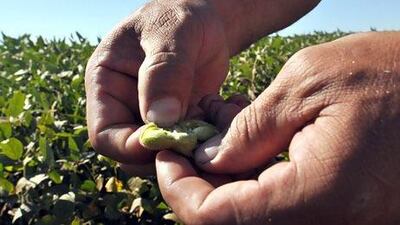Almost half of the European Union’s agricultural imports are vulnerable to drought with potential shortages looming of chocolate and coffee, according to a study published on Tuesday.
Countries who supply raw materials for European consumers, including Brazil, Indonesia, Turkey and India, face major upheaval to their crops by 2050 because of higher temperatures caused by climate change, according to the report in Nature Communications.
The crops at greatest risk include oil palm – used for food, cosmetics and biofuels – cocoa beans and coffee.
The EU imports all of its cocoa beans for chocolate, mostly from west Africa. It also consumes 30 per cent of the world’s coffee, with supply dominated by Brazil and Vietnam where the crops are threatened by drought.
A report by the Worldwide Fund for Nature earlier this month warned that the Arabica bean, which is used to make the majority of the world’s coffee, is projected to decline by up to 80 per cent in Ethiopia, where it originated, by 2080.
“The European Union’s vulnerability to climate change stretches far beyond its borders because many of its economic sectors, such as meat and dairy, use raw materials sourced from far afield,” said the report.
It found that more than 44 per cent of the EU’s agricultural imports will become highly vulnerable to drought by 2050 under a medium-emissions scenario that sees global temperatures rise by about 3-4°C by the end of the century.
The report, by researchers in the Netherlands and Spain, found that the severity of droughts in places where the EU sources its agricultural imports will increase 35 per cent by 2050, compared with current levels.
The study identified key risks to the EU from rising temperatures. It said that governments and industries need to put measures in place now to prevent shortages.
The EU relies almost entirely on imports of soybean to meet demand for animal feed. While it imports 30-35 million tonnes, it produces only 0.9 million tonnes.
“The deficit in soybean production in the EU poses a significant risk to its economy, especially to its meat and dairy industry since it is the main source of feed for animal husbandry,” it said.
Under the current climate, only 7 per cent of EU agricultural imports come from areas of medium high, or high, drought severity. But under the medium emissions model, 44 per cent of its imports come from areas of high or extremely high drought severity.
The authors of the study said that EU governments and multinationals need to source from other regions, support affected producers with more drought-resilient crops, or grow alternatives.
While more countries will be affected negatively, the study said that changes in rainfall patterns would mean that imports from some countries including Russia, Nigeria – a cocoa producer – Uganda and Kenya would be less vulnerable in the future.


